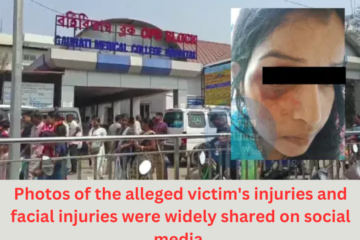
In Assam for JJM, 2.5 lakh students involved as 'jal doots'
GUWAHATI: Around 2.5 lakh students in Assam will act as ‘jal doot’ to create awareness about water conservation under the centrally sponsored flagship program Jal Jeevan Mission (JJM).
These inspectors will check the quality of piped water and the functional condition of water supply connections in each house.
“10 students from class 9th to 10th will engage as jal doot against each scheme of Jal Jeevan Mission (JJM). Students will submit their reports to the state government as their educational projects,” Assam Public Health Engineering and Tourism Minister Jayanta Mullah Baruah said.
Selected students will undergo a two-day workshop on water, sanitation and health with community engagement.
“They will go to the fields to learn about the working mechanism of the piped water supply system. They will also be given field test kits to monitor water quality. jal doots will interact with various people in the community on climate change and water conservation. Will also discuss issues like efforts and record everything in jal doot’s diary.
“Through this initiative, some environmentally conscious children will also be able to work for the betterment of the community,” said the minister.
The program will be implemented with the active support of the India National Resource Economics and Management (INREM) Foundation, a listed sector partner under the National Jal Jeevan Mission (NJJM), Ministry of Jal Shakti, Drinking Water and Sanitation.
JJM Assama has already signed a Memorandum of Understanding (MoU). A pilot workshop (Jal Shala) on safe water management for students of classes VIII, IX and XI has been organized under the jal doot program focusing on drinking water safety and a structured training module. After that, the management and functioning of PWS schemes has been reviewed. Developed by INREM.
Under ASTEC (Assam Science Technology and Environment Council and Science and Technology Department) teachers affiliated to Arybhaatta Science Center (ASC) should be assigned the role of trainer to sensitize and attract students towards jal doot programme. will
Initial discussions and meetings with ASTEC and SSA have already taken place and MoUs between ASTEC and SSA will be signed soon.
Apart from this, the best jal doot in the district will be awarded.
The JJM was announced on 15 August 2019 by Prime Minister Modi from the ramparts of the Red Fort. It is being implemented jointly by States and Union Territories.
At the time of its announcement, out of a total of 18.93 crore rural households, only 3.23 crore (17%) households had access to tap water connections. Thus the remaining 15.70 crore families depended on rivers, wells, ponds, stand posts and springs for their daily water needs.
Under the JJM programme, each household will be provided with at least 55 liters per capita per day.
While seven states and Union Territories (UTs) in the country have achieved 100 per cent piped water supply to rural households three years after its inception, more than 58 per cent households in Assam are yet to have access to piped water. There is no piped water under the scheme. .
According to official data, 67.19 lakh households are to be provided Functional Household Tap Connection (FHTC) by 2024 under 29,568 schemes.
A total of 5,190 schemes have been completed till January 24 this year. A total of 4,295 schemes have been handed over to Panchayati Raj Institutions (PRIs).
In Assam, implementation of the scheme began in 2019.
Before JJM, 1.11 lakh households in the state had piped water connections, which is 1.6 per cent of the state’s 3.30 crore population. As on 24 January 2023, 28.27 lakh households have been provided with piped water connection, which is 42.1% of the total population of the state.
Out of 25,335 villages in the state, 2,021 villages have been declared Har Ghar Jal in IMIS, while 146 villages have been certified as Har Ghar Jal villages. Of the 45,135 schools in the state, 37,634 (83%) schools have been provided with running water connections.
Out of a total of 38,455 Anganwadi centers in the state, 27,711 (72%) Anganwadi centers have been provided with piped water connections.
Meanwhile, the DPR has been prepared to provide piped water connections to two million households in the final phase.
To assess the quality and functioning of the schemes, the state government is also planning to conduct a Jal Utsav similar to Ganotsav across the state.
“After the completion of the schemes, we are going to review the water quality and functionality by organizing a Jal Utsav, where top officials and officials will be posted,” the minister said.
Currently, some women’s self-help groups (SHGs) with the support of Assam State Rural Livelihood Mission (ASLRM) have been roped in to monitor the availability of piped water through the mobile app “Jal Sarathi”.
“These SHGs verified 4 lakh piped water connections across the state. According to their report, 60 per cent of the connections were operational without any faults. This is the geo-tagged date which is correct. We have identified faults in the remaining 40 per cent of the connections. are working on removal,” said the minister.
“The JJM will not provide funds for the renovation of the 40 per cent schemes which are dormant. But we have to manage the funds from state resources,” he said.
Under the JJM Survekshan Program, 10 districts of the state have been included in the top 60 districts of the country in implementation of this scheme. Apart from this, South Saalmara has been rated as the third best in the country.
As of 2019, JJM has covered only 42 percent of rural households. Moreover, 40 percent of completed schemes are inactive.
Will rural Assam be fully covered by the Mission by 2024?
Related
Leave a reply Cancel reply
More News
Gaurav Gogoi Assam MP slams Godi media is not voice of Indians
December 27, 2023Arvind Kejriwal meets AAP NE leaders, want to strengthen party
October 17, 2023In Assam’s Nagaon man trampled by Elephant minor injured
March 23, 2023
About.
An Independent News Portal , Reporting the unreported truth of our region.










